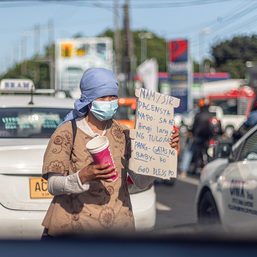SUMMARY
This is AI generated summarization, which may have errors. For context, always refer to the full article.
![[OPINION] On the ILO probe into labor rights in the Philippines](https://www.rappler.com/tachyon/2023/02/ILO-probe.jpg)
A team from the International Labour Organization (ILO) concluded last week a probe into labor rights in the country. Not as controversial as the International Criminal Court (ICC) investigation into the conduct of the war on drugs, but the ILO High-Level Tripartite Mission — as it is officially called — is as significant. Just like the ICC probe, the ILO mission was occasioned by a wave of killings, this time involving unionists, and incidents of labor repression. Unlike the ICC which has not been allowed into the country, the ILO mission finally arrived after three years of waiting.
Three years in the making
On June 2, 2019, Dennis Sequeña, a union organizer and labor leader of the group Partido Manggagawa was shot to death while facilitating a seminar for Cavite export zone workers. This brutal murder just days ahead of the ILO annual conference led to outrage from worker delegates. Days after Sequeña was buried — hailed as a hero of export zone workers by colleagues in the union movement — the ILO Committee on the Application of Standards resolved to send a high-level mission to the Philippines to inquire on its compliance with Conventions 89 and 98 (C89 and C98), international labor standards which guarantee the freedom of workers to unionize and bargain.
While Sequeña’s death may have been the straw that broke the camel’s back, the ILO in fact had been deluged with complaints of violations of C89 and C98 for more than a decade. In 2007, the allegations included the killings of 80 unionists, along with union intimidation in export processing zones. The gravity of the accusations led to a decision for an ILO high-level mission, but the government successfully parried its immediate entry. However, the threat of losing trade privileges with the United States due to human rights issues forced the administration of Gloria Arroyo to open the door to the ILO probe in 2009. The lack of progress in protecting workers’ rights and implementing the recommendations of the 2009 probe led to a 2016 ILO “direct contacts mission.”
Within 14 years, the Philippines has been subject to three ILO missions due to grave allegations of labor rights violations. This correlates with the fact that the Philippines has perennially been listed by the International Trade Union Confederation, the peak global union body, as among the 10 worst countries for workers. The ruthless slaying of Sequeña was therefore not an isolated incident. His death may have been perfectly timed to derail union organizing in the Cavite export zone, but it came at a bad occasion for the Philippine government, which now had to face another ILO investigation.
Stance of the three actors
The pandemic gave the Duterte administration a chance to delay the ILO mission’s arrival. But accusations of labor rights violations surged ahead during COVID-19. Since the 2019 decision to send an ILO mission, trade unions have documented 16 labor-related killings, 2 cases of forced disappearances, 68 cases of arrests, 90 cases of forced union disaffiliations and other forms of union interference, 58 cases of red-tagging, 127 cases of intimidation of union leaders and members, and 19 cases of other anti-union activities.
Among these was the killing of Solidarity of Cavite Workers leader Manny Asuncion at the very office of the Workers Assistance Center by police who claimed he “fought back” — like the thousands of alleged addicts slaughtered during the war on drugs. The Inter-Agency Task Force on Extra Legal Killings constituted under Administrative Order 35 — which was an outcome of the first ILO mission in 2009 — filed a case against 17 policemen for Asuncion’s murder. A week before the new ILO mission arrived, the Department of Justice dismissed the complaint for “lack of probable cause.”
While killings of unionists are the most extreme violation of labor rights, there are other forms which are still serious. Labor unions in Coke plants in Metro Manila, Ilagan in Isabela, San Fernando in Pampanga, Bacolod, Davao, Tagum, and General Santos — affiliated with the labor group Sentro ng mga Nagkakaisa at Progresibong Manggagawa — alleged connivance between the multinational company and local police in red-tagging and cajoling workers to disaffiliate. The association of non-uniformed personnel of the Philippine National Police (PNP) — affiliated with the Public Services Labor Independent Confederation — also complained that it was red-tagged, its officers harassed and its president illegally dismissed from service.
All these transpired during the pandemic, but are just a sample of the cases cited by trade unions which represent the full spectrum of Philippine labor movement, from the conservative to the radical. Such a display of unity by the fragmented workers movement is extraordinary but only reflects the dangerous situation confronting all unionists in the country.
In its presentation to the ILO mission, the Employers Confederation of the Philippines (ECOP) condemned violence against unionists but asserted that none of its members are involved and most of the issues are not labor-related. Still, it called for a closure as “the only way to move forward.”
The Department of Labor and Employment emphasized that the government is earnestly tackling the complaints about killings and red-tagging even as it also maintained that most of the allegations are not labor-related. However, other government agencies were not as circumspect in their statements to the ILO mission. The Armed Forces of the Philippines and the National Task Force to End Local Communist Armed Conflict both denied the allegation of red-tagging but in the same breath accused the Kilusang Mayo Uno of being a communist front. The Philippine Economic Zone Authority and the PNP contradicted each other about the status of the controversial program called JIPCO which allows police presence in export zones: the former said it was in abeyance but the latter considered it active.
Three months to ILO conference
It must be noted that the mission was composed of one representative each from the governments, employers, and workers that comprise the ILO. The ILO is the only United Nations agency with such a tripartite organization, reflecting the three main actors in the world of work.
The ILO mission drafted its initial findings and recommendations, and presented it before a multi-stakeholder meeting before it left the country. Among its salient conclusions was the presence of a “mindset linking” unions to the insurgency without the benefit of due process, which has led to a climate of impunity and violations of workers’ rights. Corollary to this, among its key recommendations is the establishment of a presidential body tasked to resolve all the outstanding alleged cases of killings and abductions of unionists.
In the Philippines, as elsewhere, improving labor rights and strengthening workers’ power are necessary counter-weights in an era of wealth inequality and a cost-of-living crisis. The 2009 ILO mission resulted in a series of reforms which unfortunately was not enforced effectively. Can the 2023 ILO mission make a difference?
While the ILO has no police power to enforce its recommendations, it does exercise moral suasion among governments and the public. The onus is now on the administration of President Bongbong Marcos to do something concrete in the more than three months to the next ILO conference in June. The clock is ticking. – Rappler.com
Benjamin Velasco is Assistant Professor, UP Diliman School of Labor and Industrial Relations (SOLAIR) and Co-Convenor, Program on Alternative Development, UP Center for Integrative and Development Studies (UP CIDS AltDev). Opinions expressed here are of the author alone and do not reflect those of his affiliations.
Add a comment
How does this make you feel?
![[OPINION] Dignitas laborem: Fighting for dignity of work in the Philippines](https://www.rappler.com/tachyon/2023/01/dignity-work-january-25-2023.jpg?fit=449%2C449)
![[OPINION] Unpaid care work by women is a public concern](https://www.rappler.com/tachyon/2024/07/20240725-unpaid-care-work-public-concern.jpg?resize=257%2C257&crop_strategy=attention)




There are no comments yet. Add your comment to start the conversation.